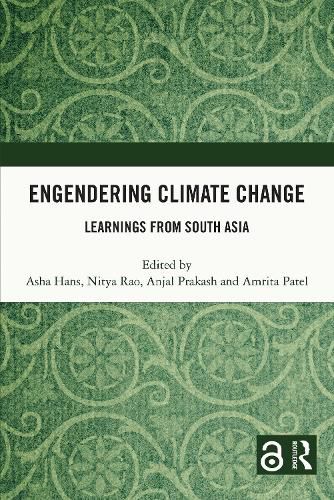Readings Newsletter
Become a Readings Member to make your shopping experience even easier.
Sign in or sign up for free!
You’re not far away from qualifying for FREE standard shipping within Australia
You’ve qualified for FREE standard shipping within Australia
The cart is loading…






This book focuses on the gendered experiences of environmental change across different geographies and social contexts in South Asia and on diverse strategies of adapting to climate variability.
The book analyzes how changes in rainfall patterns, floods, droughts, heatwaves and landslides affect those who are directly dependent on the agrarian economy. It examines the socio-economic pressures, including the increase in women’s work burdens both in production and reproduction on gender relations. It also examines coping mechanisms such as male migration and the formation of women’s collectives which create space for agency and change in rigid social relations. The volume looks at perspectives from India, Pakistan, Bangladesh and Nepal to present the nuances of gender relations across borders along with similarities and differences across geographical,socio-cultural and policy contexts.
This book will be of interest to researchers and students of sociology, development, gender, economics, environmental studies and South Asian studies. It will also be useful for policymakers, NGOs and think tanks working in the areas of gender, climate change and development.
$9.00 standard shipping within Australia
FREE standard shipping within Australia for orders over $100.00
Express & International shipping calculated at checkout
This book focuses on the gendered experiences of environmental change across different geographies and social contexts in South Asia and on diverse strategies of adapting to climate variability.
The book analyzes how changes in rainfall patterns, floods, droughts, heatwaves and landslides affect those who are directly dependent on the agrarian economy. It examines the socio-economic pressures, including the increase in women’s work burdens both in production and reproduction on gender relations. It also examines coping mechanisms such as male migration and the formation of women’s collectives which create space for agency and change in rigid social relations. The volume looks at perspectives from India, Pakistan, Bangladesh and Nepal to present the nuances of gender relations across borders along with similarities and differences across geographical,socio-cultural and policy contexts.
This book will be of interest to researchers and students of sociology, development, gender, economics, environmental studies and South Asian studies. It will also be useful for policymakers, NGOs and think tanks working in the areas of gender, climate change and development.